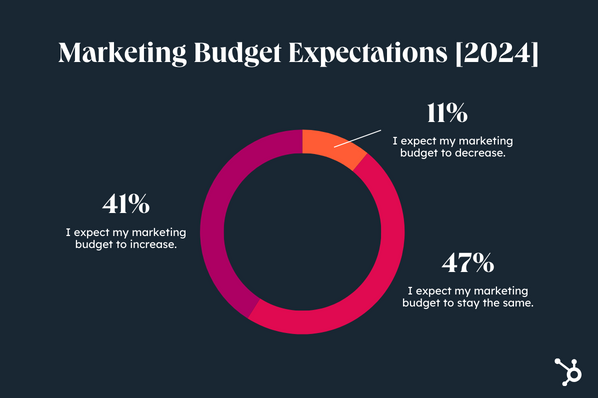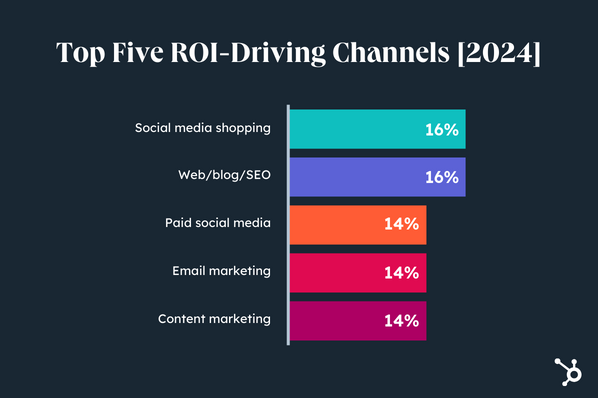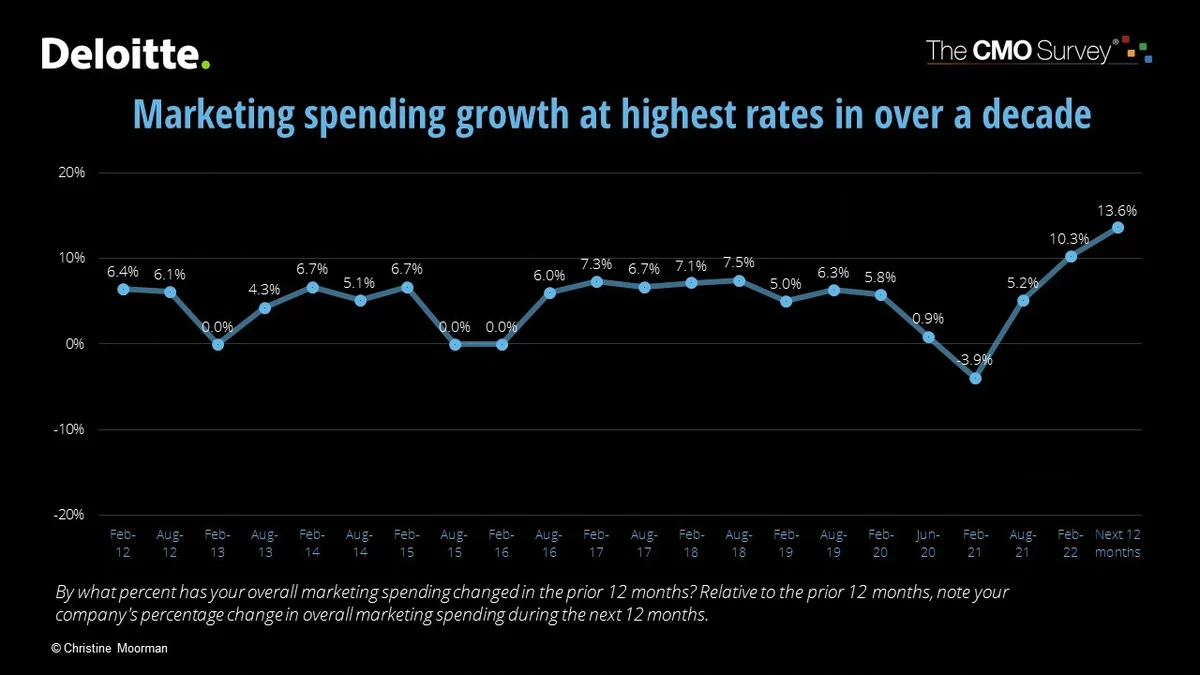Our most recent State of Marketing Report tells us that marketers are pretty confident when deciding where to invest their budget in 2024.

We’re looking at 57% who feel somewhat confident, and 26% who are very confident their budget plans will maximize ROI for their business.
I want you to feel confident in your spending plans, too, so I created this guide to help you compare how your budget matches up against competitors.
Table of Contents
- Why You Need a Marketing Budget
- Inside a Typical Marketing Budget
- Marketing Budget as a Percentage of Revenue
- Marketing Budgets by Industry
- 7 Expert Tips for Making the Most Out of Your Marketing Budget
Why You Need a Marketing Budget
Today’s marketing landscape is complicated. Budget cuts have become common and underperforming marketers quickly fall under the axe.
And data from our State of Marketing Report supports this — nearly 60% of marketers say the way they spend their budget is being scrutinized either somewhat more or much more now than in the past.
Creating a comprehensive marketing budget is your silver bullet for avoiding these outcomes and having cash to execute your marketing strategy.
Developing a marketing budget also helps you:
- Prioritize projects to invest in.
- Allocate funds for software purchases.
- Compare your year-over-year progress.
- Allocate funds for projects in advance.
- Justify the importance of specific projects.
- Calculate the ROI from your marketing projects.
- Show the value of proposed marketing projects to your higher-ups.
- Show positive ROI, which can help you get a better budget in the future.
- Allocate funds for freelancers and full-time hires who’ll execute your strategy.
.png)
8 Free Marketing Budget Templates
Free templates to manage your marketing spend across channels.
- Product marketing budget template
- Paid advertising budget template
- PR budget template
- And more!
Inside a Typical Marketing Budget
According to Deloitte, marketing comprised roughly 13.6% of a company’s total budget in 2023. That’s up 3.9% from the two previous years.
Many marketers expect their annual budgets to increase in 2024.
Based on our survey of 1,400+ marketers, 41% of respondents reported that their budget would increase. However, the majority of marketers (47%) expect their budgets to stay about the same.

Prioritization of marketing channels is also shifting. Businesses are seeing the biggest ROI from social media shopping tools, like TikTok Shop and Instagram Shops, and investing accordingly.
This doesn’t surprise me considering the growing popularity of influencers on social. Brands are meeting consumers right where they are and on their favorite channels. Plus, if you ask me, being able to buy products without ever leaving the app is top-tier customer experience.
Here are the top five ROI-driving channels based on our survey:
- Social media shopping tools (e.g., TikTok Shop)
- Web/blog/SEO
- Paid social media content
- Email marketing
- Content marketing

Further, video will be a bigger investment in many marketers’ budgets. We found that 71% of marketers plan to leverage either short-form or long-form video as part of their content strategy.
As a marketer myself, I see the power of video in helping brands tell their story. I’d expect this investment to continue to increase over the next few years.
Meanwhile, on TikTok, 56% also plan on increasing their TikTok investment in 2024 — the highest increase of any social media app. Another 33% plan to maintain their current TikTok budget.
Influencer marketing is another lead-generation tactic worthy of investment, and this trend will continue in 2024.
In fact, 87% of marketers plan to increase or maintain their investment in influencer marketing.
TikTok is hot right now, and it’s moving up the ranks with 45% user share in 2024.
Plus, influencers are a great way for brands to connect with and relate to their audiences.
I’d be surprised if marketers weren’t boosting these investments this year.
Marketing Budget as a Percentage of Revenue
The amount of revenue businesses allocate to marketing has grown over the last few years, with the average at 9.1% of overall company revenue in 2023 compared to just 6.4% in 2021.
Decisions related to marketing budget allocation remain largely industry specific.
As a general rule of thumb, B2B companies should spend between 2-5% of their revenue on marketing, and B2C companies sit a little higher at 5-10%.
Marketing Budgets by Industry
Based on The CMO Survey, here’s the average percentage of revenue industries are spending on marketing.
|
INDUSTRY |
MARKETING BUDGET (% OF COMPANY REVENUE) |
|
Banking/finance/insurance |
9.49% |
|
Communications/media |
14.27% |
|
Consumer packaged goods |
25.19% |
|
Consumer services |
11.74% |
|
Education |
11.50% |
|
Energy |
3.83% |
|
Healthcare |
6.80% |
|
Manufacturing |
3.75% |
|
Mining/construction |
6.50% |
|
Pharma/biotech |
12.83% |
|
Professional services |
7.08% |
|
Real estate |
10.61% |
|
Retail wholesale |
14.52% |
|
Service consulting |
21% |
|
Tech software/platform |
11.8% |
|
Transportation |
1.52% |
As a marketer, it’s important you use these percentages as benchmarks, especially for industries allocating low marketing budgets.
If your industry is reluctant to spend on marketing initiatives, that’s an opportunity for your team to shine.
Once you convince the higher-ups about what you need to execute your top strategies, you’ll easily outshine others in your industry and make your company a reference for how other teams should do marketing.
7 Expert Tips for Making the Most Out of Your Marketing Budget
1. Understand your customer journey.
A customer journey is not as straightforward as Googling a term, jumping on an email list, and then converting. The journey is full of twists and turns.
Figuring out how your customers go from product awareness to purchase varies among industries. What works for B2B brands may not work for B2C, or for small businesses.
This is why David Hoos, B2B performance marketing manager at The Outloud Group, says you should take time to understand your customer journey before spending a dime of your marketing budget. If you invest in this research first, you'll uncover:
- What channels to spend your budget on.
- What platforms to reach your target audience.
- What messages will resonate with them.
- What creative will entertain and educate them.
- What solution will convert them.
Understanding your customer journey is key to unlocking the highest ROI efforts. And reporting tools like HubSpot’s Customer Journey Analytics can help you paint a clearer picture.
Done right, this guarantees the best use of your marketing budget.
2. Hire a marketing agency where needed.
It may be difficult to oversee multiple marketing projects without help — even when you have an in-house marketing team.
Besides the time required to hire, train, and onboard a team, you’ll pay salaries and offer some benefits. All this might be a stretch if your budget can’t cater to a huge team or if you don’t have the time to supervise them. This is where marketing agencies come in.
While agencies aren’t cheap, they eliminate some of these challenges and they can function as an extended arm of your team.
Partnering with marketing agencies also gives you access to a team of specialists who may help you hit your goals faster and won’t waste your marketing budget.
3. Get an in-house marketing team.
Relying on an agency to run all of your projects isn’t the wisest use of your marketing budget. Marla Malkin, vice president of marketing and strategic partnerships at Attivo ERP, agrees.
4. Invest in content repurposing and updating.
Charlie Southwell, marketing director and SEO specialist at Let's Talk Talent, notes that creating unique and valuable content is expensive. For this reason, Charlie’s team tries to repurpose everything they create.
Their first step is to produce evergreen content that’ll remain valuable for at least two years. After creating these assets, the team repurposes and promotes them in multiple content formats.
If you have published some evergreen assets a while back, consider updating them. Besides providing current info for your audience, a content update may make your pieces move up the SERPs.
The best part about content repurposing and updating is the leeway to re-promote your assets multiple times a year. In Charlie’s words, “Not doing this is a missed opportunity that prevents content from getting enough mileage and maximizing value from your marketing budget.”
5. De-prioritize underperforming channels.
Understanding the channels that drive the most revenue for your business is critical to marketing budget optimization.
Businesses should constantly assess their campaigns to uncover those that underperform, As says Sidharth Kumar, director of product marketing at Exoprise Systems. Doing so will help optimize spending in the right direction and phase out campaigns that don’t generate any ROI.
If you have data suggesting some underperforming channels might still work, use those channels for experimentation and apply the 70-20-10 rule when budgeting for them.
Here, 70% of your marketing budget goes to proven strategies, 20% goes to new strategies, and 10% goes to experimental strategies, which could highlight opportunities for future growth.
6. Constantly re-evaluate your marketing strategy.
A marketing strategy that’s done right will have objectives and key results, which follow the SMART framework. This is important for budget optimization, as SMART goals and metrics help you track progress and identify channels and campaigns that work.
“Constantly reviewing and re-evaluating your marketing strategy helps you know when to stay the course or pivot,” says Thomas Simon, marketing manager at Monitask. “It also lets you use effective tactics and not blindly follow a particular plan without the data or results to back your decision.”
But how often should you do a review?
Corey Haines, co-founder of SwipeWell, recommends marketers do a biweekly or monthly review of budget allocation. “Regular reviews help you cut unnecessary spending, reallocate to high-performing campaigns, and decide when to increase or decrease variable costs like ad spend,” Corey says.
.png)
8 Free Marketing Budget Templates
Free templates to manage your marketing spend across channels.
- Product marketing budget template
- Paid advertising budget template
- PR budget template
- And more!
7. Don’t underestimate the power of automation.
According to our survey, 74% of marketers currently use AI/automation tools in their role, and 59% of those marketers plan to continue using them in 2024.
Chang Chen, Head of GTM at Bardeen.ai, is seeing significant efficiency boosts from integrating AI and automation.
“AI now aids with SEO, user research, and even the crafting of highly personalized emails. This allows our team to focus on strategic and creative aspects of their work, freeing them from routine tasks and enabling them to apply their creativity towards business expansion,” says Chen.
“It also shortens the time to market and quickens the feedback cycle, fostering growth. An experiment that used to take 1-2 months to launch can now be ready in a few weeks.”
Here’s how Chen ties this investment back to budget planning.
“We have incorporated this improved efficiency directly into our marketing budget. This not only optimizes the use of our current resources but also allows room for innovation,” says Chen.
“We have allocated a portion of our budget specifically for experimentation, allowing us to continue exploring the capabilities of new technologies and automation possibilities.”
Manage Your Marketing Budget the Right Way
Ultimately, being a successful marketer isn‘t just about thinking strategically. It’s also about adhering to a strict budget, achieving new levels of growth, and choosing the most cost-effective options for your company.
Now that you know the typical percentage of a marketing budget by percentage and revenue the next step is to learn how to manage your marketing budget effectively.
Editor's Note: This post was originally published in March 2021 and has been updated for comprehensiveness.




![How Marketing Leaders are Navigating Recession [New Data]](https://blog.hubspot.com/hubfs/how%20marketing%20leaders%20are%20navigating%20recession.webp)
![3 Ways Marketers are Already Navigating Potential Recession [Data]](https://blog.hubspot.com/hubfs/how-marketers-are-navigating-recession.jpg)
![Marketing Without a Budget? Use These 10 Tactics [Expert Tips]](https://blog.hubspot.com/hubfs/marketing%20without%20budget.jpg)


![How to Manage Your Entire Marketing Budget [Free Budget Planner Templates]](https://blog.hubspot.com/hubfs/free-marketing-budget-templates_5.webp)


